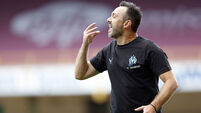United should have banned Ferdinand
Alex Ferguson can, if he chooses, take a benign view of his demonisation in the media because of his lofty perch on top of the Premiership. “No worries” might well be his cant as United take an overview of the competition.
He can take comfort in the knowledge that United have seldom played to their full potential this season - the best is yet to come.














